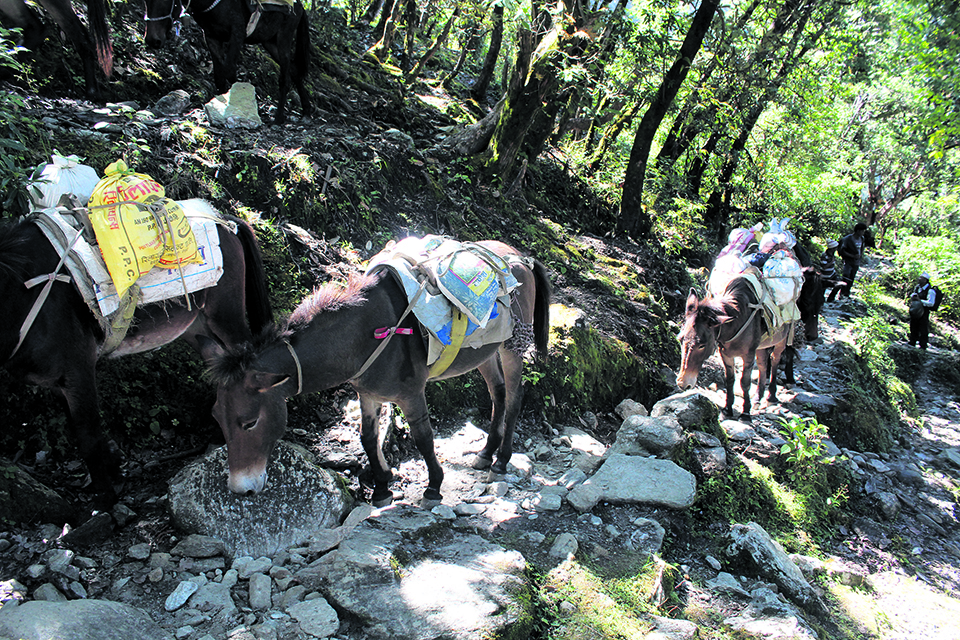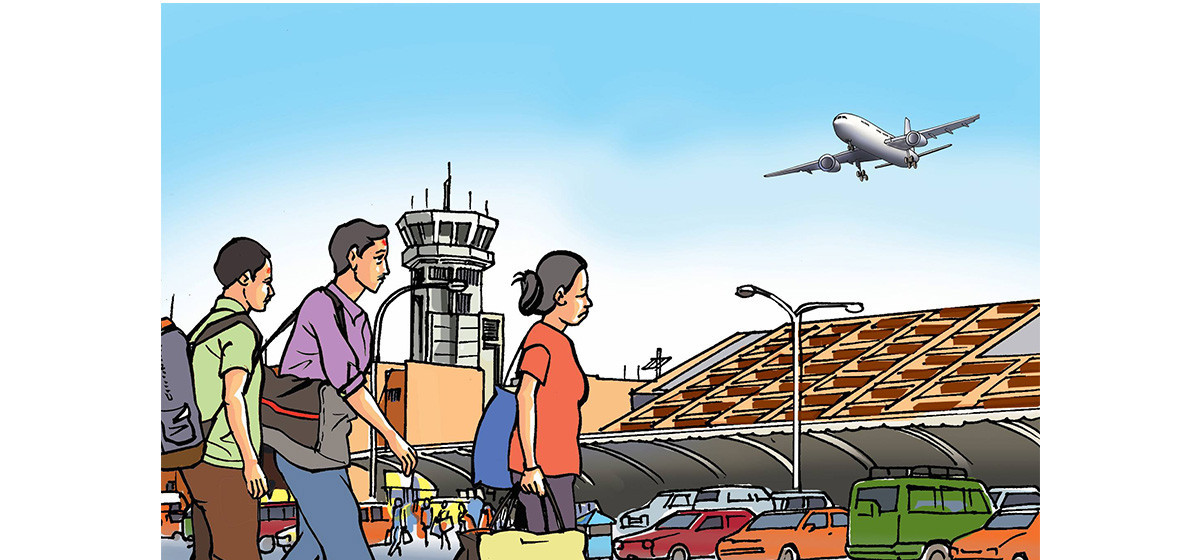
OR
Mules still only means of transportation in rural Dhading
Published On: November 5, 2017 04:30 AM NPT By: Sarita Shrestha

DHADING, Nov 5: Naresh Tamang of Tipling village has 12 mules. There were more. But the perilous journeys across the hills claimed lives of a few. “A little carelessness in treading along those hills can claim life, whether it is human or mules,” he said. “Once you trip off the path, there is no chance of surviving the steep fall. I have already lost three mules to these risky routes,” he added.
Like in other districts across the country, many road tracks have been opened here also in the recent years. However, these have not brought about the changes that rural parts of this district were expecting. Instead, these tracks while being haphazardly constructed have also affected the environment. As a result, most rural parts of the district still rely on mules as the only means of transportation. Tipling, Setung, Lapa and Jharlang, among other areas, carry goods on a regular basis through the mules.
“It’s not only the mules that carry goods, humans also carry goods. Even while the mules transport the goods, we hardly walk free,” elaborates Tamang. “There is no means other than to use muscle power to transport goods. So along with humans, we use mules for transportation.”
Tamang makes his living by transporting goods on mules. He says he carries his own goods and also rents out his mules to transport others goods as well. “I am not a businessman. However, I rent my mules to others for transporting goods,” he said. Mules are mostly used here to transport rice, pulse, potato, oil and construction materials like sand, pebbles and so on.
Considering the woes of transporting goods through mules and subsequent additional transport that they have to pay on commodities, residents of rural areas stress on the need of building road networks in their areas. Though some of these areas are connected to road network, the quality of the road tracks is so bad that it is nearly impossible for vehicles to ply on them during the monsoon season. And some of these roads fail to operate in other parts of the year due to lack of repairs.
“Opening road tracks is not sufficient, they should be usable. What is the purpose of opening a road track, if it cannot be used? There are newly opened road tracks in the headquarters area. But, in rainy days, vehicles can hardly ply on them,” Tamang stated.
Though people in these parts of the district anyhow manage to transport groceries and other daily necessities by using mules and sometimes humans, they become helpless when it comes to rushing someone to hospital or if someone has to reach another destination in a short period of time. In either of the situation, the only option for them to use their legs and in case of medical emergency, they have to rely on villagers to carry the patient to hospital.
“It seems that the government does not bother about the difficulties we face every day. People here die in lack of access to health services. In case of medical emergencies like pregnancies, mules cannot help us. We are forced to travel on foot carrying those patients to the nearest hospital. It is very painful, when someone you carry through the difficult trail but does not survive.”
Tamang stated that people who can afford sometimes charter helicopter to airlift their patients to the capital, but for most of the residents they cannot even think of such an alternative as it costs millions of rupees.
Even getting assistance from villagers to carry patients to hospital comes at a very steep cost. “When you request your villagers to take your family members to hospital, you have to take care of their lodging and food, among others. This costs you dearly. Taking a patient to the hospital and bringing back home is very costly here,” said Tamang adding that many families “let their dear ones die untimely because they cannot manage the cost”.
Locals further lament lack of health posts and hospitals in their vicinity. If there were reliable health centers in our vicinity, we would at the least get access to health services. “One does not have to be infected with fatal disease. Even small health ailments, like fever or wound claim lives here,” said Maili Tamang of Setung. “We cannot afford to charter helicopters for carrying our patients to cities. And as we don’t have medical professionals or medicines nearby, people die because of small diseases also,” she added.
Maili further shared that children in the villages are getting neither good health nor good education. In lack of road networks, there has been no development at all, she said.
Rame Tamang, who was spotted at Dhadingbesi on Friday loading goods on mules, said that it takes three days for him to reach his home in Setung. “It takes around three days for us to get here and equal number of days to return. And if mules get sick on the way, it becomes indefinite,” he said.
In lack of easy access to market, locals have to pay much higher price for goods. Except for potato and a few types of grains which they grow locally, they have to buy everything from market and paying for the transportation, cost them very dearly. “If there were smooth roads, even with little money we would have been able to afford our daily needs. No road means that everything is costly,” Rame said. He said that around 400 mules are used in Dhading for transporting goods to remote areas.
You May Like This

Rural municipality has no means of communication
PYUTAHAN, July 7: Though the human civilization and technological advancement has taken a new leap, locals living in many wards of... Read More...

NC wins in 1 Municipality, 3 Rural Municipalities, UML in 2 Rural Municipalities in Myaddi
MYAGDI, May 18: Nepali Congress mayoral candidate Hari Kumar Shrestha has won the race for the mayor of Beni Municipality... Read More...



Just In
- 550,000 people acquire work permits till April of current fiscal year
- Fixing a win by outlawing dissent damages democracy
- MoHP cautions docs working in govt hospitals not to work in private ones
- Over 400,000 tourists visited Mustang by road last year
- 19 hydropower projects to be showcased at investment summit
- Global oil and gold prices surge as Israel retaliates against Iran
- Sajha Yatayat cancels CEO appointment process for lack of candidates
- Govt padlocks Nepal Scouts’ property illegally occupied by NC lawmaker Deepak Khadka









_20220508065243.jpg)



Leave A Comment